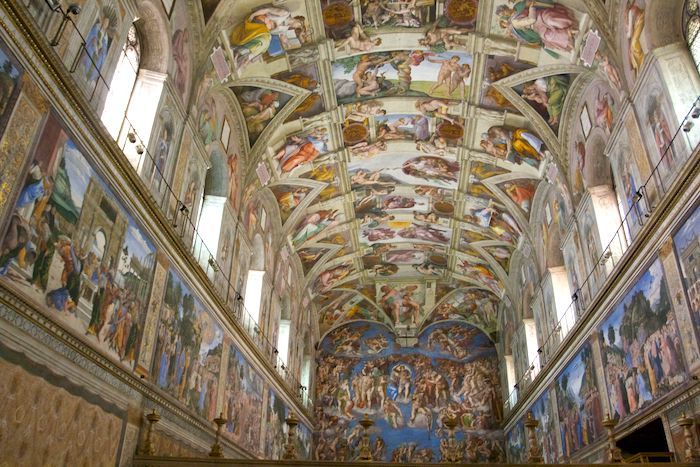I looked up. Looming above me was the ceiling of the Sistine Chapel. The air was thick, the room was packed, but the ceiling was free from the pressing crowd. I tried to ignore everything around me and focus. My eyes drank in Michelangelo’s stunning work — the story, the forms, the glory. Standing in that place of beauty, I felt as though I was the one who was reaching out and grazing the hand of God.
This is what art is for me — a place where I encounter the divine. For that reason, I dream of seeing a renaissance of the arts among the Christ-professing peoples of the West. I’m not talking about those repetitive worship songs where we sing the same line a hundred times. I’m talking about art that makes kings rise, that leaves critics speechless and that makes the common man fall to his face and worship God. I’m talking about Mozart’s Requiem, C.S. Lewis’ “The Chronicles of Narnia” or Mel Gibson’s “The Passion of the Christ” — the kind of art that never really leaves you after you’ve experienced it. The kind that changes you and gives you hope.
But what will it take to get there?
I think of the story of Jesus reclining at the table with His disciples, when a woman came and poured perfume on His feet and wiped them with her hair. Those around Him were indignant with her. “What a waste!” they cried, “This perfume could have been sold and the money given to the poor!” But Jesus rebuked them, saying, “Why do you trouble her? She has done a beautiful thing to me.”
This is art — a beautiful thing, poured out at Jesus’ feet. No one else is worthy of it, nor is anything else worthy of Him. A beautiful God deserves beautiful things. Likewise, we dishonor God by pouring at His feet anything less than what is beautiful. Secular art misses the mark because it is a beautiful thing poured out for that which is not worthy. We believers miss the mark when we fail to pour beautiful things at the feet of Christ because we know how beautiful He is.
Art is sacrifice. It costs time, money, resources. It was the “religious” in the room who scolded the woman for her actions. “Why was this ointment not sold for three hundred denarii and given to the poor?” This is how we Protestants in the West have often fallen short. Why give our money to produce a film, a play, an art installation or a new musical piece when the money could be spent on the poor? Or on getting a better sound system? Or building a new building? Or financing our missionaries? Yes, I’m a missionary’s kid and we need money to survive, but God’s ministry is not bound to ministers, missionaries or church services. Jesus deserves our worship in these ways and so much more. What might seem frivolous and wasteful to us can be precious to Him.
The secular world has had a renaissance of their own in recent years. In their flood of art, we Jesus-followers have followed behind clumsily trying to copy their creations. This has caused our culture to look nearly identical to theirs because what we consume consumes us. Today in the West, what the disciple of Jesus listens to, watches, plays, attends and even creates is almost always identical to what every other nonbeliever does. This is concerning.
I don’t say this because of some stupid culture war. “Our struggle is not against flesh and blood.” I say this because what we love is what we worship, and we become what we adore. To the world, good art is escape. Whatever brings us that high, that emotional rush, that sensual blush, that adrenaline burn, that is good art. Because we have abided in these things, disciples in the West have been shaped to look at life through this lens, to think that in order to encounter God and be known, loved and fulfilled we must find a way to escape. But in the Kingdom of God, good art is redemption — art that empowers us to live into the truth of who God created us to be, to delight in His creation and to find fulfillment in Him and what He has already given us. Artists and art-lovers, creators and patrons, apprentices of Jesus, we need beautiful art because nothing else is worthy of our beautiful God. If we want the world to see how glorious our God is then we must show them by what we create. But even more so this is my plea: Paul says, “We are his workmanship, created in Christ Jesus for good works.” We are God’s masterpiece! He crafted us, in Christ, to be image-bearers for the world that they might know His beauty. Therefore, we should do everything to live beautiful lives, lives worthy of a beautiful God. Our lives, like our art, should be holy places where people from all around the world can come and graze the hand of God.




